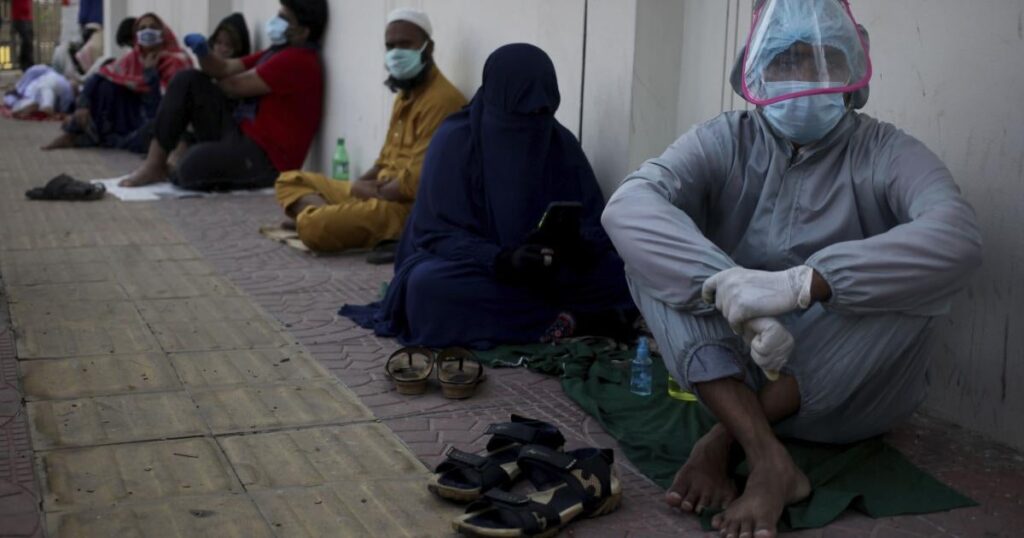Nine-months pregnant, Fatema Akhter Mukta, 30, died on June 10 after her family struggled for five days to find a hospital in Bangladesh willing to admit her when she began having trouble breathing. When, finally, a hospital admitted her and referred her to Chittagong Medical College for its intensive care facilities, it was too late.
“Every hospital refused to admit her when they learned my wife was having trouble breathing, suspecting it to be Covid symptoms,” said Towhidul Arzu, Fatema’s husband. “When I begged them to help her, one doctor showed me a long waiting list of patients.”
As governments around the world struggle to contain the pandemic, Human Rights Watch has called to uphold rights including access to health and education, protection of vulnerable communities, migrant workers, religious minorities and medical personnel.
Fatema’s experience has become tragically common right now in Bangladesh, with the healthcare system overwhelmed by the pandemic. As the recorded deaths from Covid-19 passes 1,300 and with nearly 100,000 testing positive, the Bangladesh government needs to step up its efforts.
The rate of infections is likely much higher given Bangladesh’s low levels of testing—Bangladesh has tested about 554,000 people in a country of nearly 165 million, with a rate of positive tests hovering around 20 percent. The World Health Organization has suggested that until positive tests come in at about 10 percent, more testing is needed to understand the actual prevalence of Covid-19 in the population.
Some of my Bangladeshi friends worry they might have symptoms, while others are slowly recovering. Several have relatives and friends who have tested positive. Some who have lost loved ones believe prompt medical care could have saved them.
Government hospitals across the country have only 733 intensive care unit (ICU) beds and fewer than 1,800 ventilators, meaning too few of those who test positive could potentially access care facilities. Those with symptoms consistent with Covid-19 increasingly report being turned away from both public and private hospitals. There are massive disparities in health access throughout the country. Only about 25 percent of the country’s limited number of health workers are in rural areas, where about 70 percent of the population lives. And while most of the country’s doctors, ICUs, and ventilators are in Dhaka, for the millions of people living in the city’s slums, these services remain difficult to access.
Two doctors currently serving in Covid-19-dedicated hospitals, speaking on condition of anonymity, said they were overwhelmed, and that limited facilities mean patients without clout are being denied treatment. “Thousands are coming to the hospital with Covid symptoms,” one of them said. “We have to accept patients if they are referred to us by higher ups and end up refusing others because there are no beds available.”
In response to reports of hospitals turning people away, Health Minister Zahid Malik warned doctors to provide medical services and said that the authorities “will not hesitate to take action against those who fail to do so.” But doctors aren’t turning people away because they are cold-hearted or incapable. They simply don’t have the resources they need to care for patients, or even to protect themselves. Hospitals are full and even ailing doctors are reportedly being turned away.
Nor do health workers have sufficient personal protective equipment to safely provide medical care. A Bangladesh Doctors’ Foundation survey conducted in April found over one third of 826 doctors from private hospitals did not have sufficient protection. Conditions are most likely worse in public hospitals, where more doctors have reportedly contracted the virus. According to media reports, some doctors are wearing raincoats in place of adequate personal protective equipment.
Health workers are paying painfully for this deficit. As of June 14, according to the Bangladesh Medical Association, 31 health workers had died from the virus and over 3,164 more had been infected. The Doctors’ Association of Bangladesh has called for more tests, more facilities for Covid-19 patients, adequate personal protective equipment for all health workers, and social services for the poor.
Instead of listening to health workers and addressing their concerns, the authorities have cracked down on those who speak out, including with the draconian Digital Security Act, and issued blanket gag orders to doctors and nurses.
The government hates criticism. But when dealing with such a massive global crisis, it needs to at least be willing to listen to healthcare professionals, journalists, and others so that it can effectively protect public health and provide resources where they are most urgently needed.

